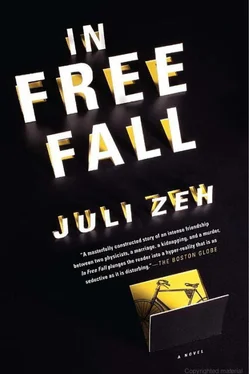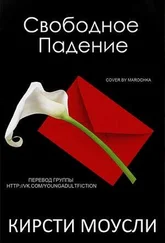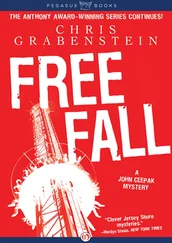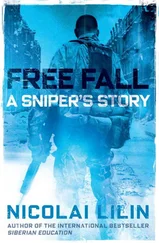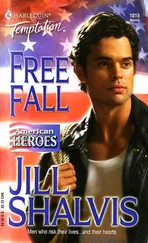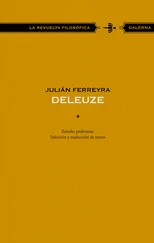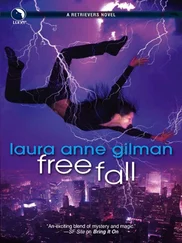“Schilf.” Sebastian slowly takes his gaze from the ceiling and repeats the name, which feels good in his mouth. Schilf.
Their eyes meet. Somewhere in the apartment an object falls to the ground but neither of them turns his head. The detective wonders why it is suddenly so dark. The headlights of a passing car lift the room and turn it on its own axis; Sebastian sits on the sofa, Schilf in the armchair, then Schilf on the sofa, Sebastian in the armchair. Then the car is gone. They nod to each other. The combine harvesters are working in the fields outside the town; somewhere Julia is sighing in her sleep. The detective wheezes air out of his lungs once ( ovum ) and twice ( avis ). A sharp beak is pecking the shell of the bird’s egg. It is bright again, midday in summer, with dusty shafts of light by the window. Sebastian looks at Schilf with a mixture of suspicion and interest. He leans forward, almost as though he wants to take the detective by the hand.
“I want no further investigations,” he says.
“You don’t want to know who kidnapped your son?”
“I want to forget.”
“Bad idea. You’ll only realize when it’s too late.”
“I’m not interested in too late. I’m interested in now. I don’t know what the word ‘future’ means anymore. There are situations where you have to draw the line. Do you see?”
“Even before you started going into detail,” the detective says.
When Sebastian raises his arms to brush his hair out of his face, they both see how badly his hands are trembling. The skin beneath his rolled-up sleeves is thickly covered with scratched insect bites, some moist and inflamed and others crusted with yellow. Sebastian buttons his cuffs.
“Can I get you something to drink?”
“Yogi tea.”
“Sorry, what?”
“Look in the kitchen. A woman like your wife will have something like that.”
“How do you know Maike?”
“She just ran past me.”
Sebastian pauses for a moment before he gets up and leaves the room. Schilf listens to the rustling in the kitchen cupboards, which stops when Sebastian finds the box of tea. The detective stands up quietly and crosses the room as carefully as if the floor were littered with dry twigs that might snap beneath his feet. He has no problem finding the study. Books fill the shelves and lie in piles on the floor. The computer keyboard on the desk is covered with a strangely shaped piece of red card. Schilf rifles through a pile of papers with practiced fingers.
“The Problem of Precision in the Constants of Nature,” “The Purpose of Absurdity,” “Materialism and the Metaphysical Landscape”— We cannot ascertain that the universe was created with regard to a living observer…
Or by an observer, the detective thinks.
He opens and closes drawers. A Yogi tea has to be brewed for about fifteen to twenty minutes on a low flame.
Pencils, used paperclips, letterhead paper from the university. Right at the back of a drawer, there is a photo of two young men in formal suits, slim as whippets, hands casually shoved into the pockets of their striped trousers. Although the faces are turned toward each other, their gazes are lost in the middle distance. Schilf puts back the photo. A normal detective would find a decisive clue among such documents. Schilf finds nothing.
When Sebastian brings in the tea, Schilf has been sitting in the armchair for some time. The scent of ginger and cardamom fills the room.
“This doesn’t taste too bad.” Carefully Sebastian puts down his cup; his hands have steadied.
“Do you collect art?” Schilf asks, pointing at two knobbly paintings whose thickly applied explosions of color in red and black portray a throbbing headache. Clearly the artist takes a different view; he has marked the titles of the paintings in crude letters across the canvas: Blackmail I and II .
“My wife runs a gallery.”
“And likes cycling?”
“Is this the start of the interrogation?”
“Not an interrogation.” Schilf waves his teaspoon dismissively. “Just asking some questions.”
“What’s the difference?”
“You. You are not a suspect, but someone who has reported a crime, and also a witness.”
Sebastian laughs, and does not reply.
“If you’re ready,” Schilf says, “I would like to ask you a few questions.”
“About the kidnapping?”
Now the detective laughs.
“No. About the nature of time.”
“YOU’RE A STRANGE KIND OF DETECTIVE. It’s not that I don’t want to talk about the nature of time. That’s my job, after all. But do you really want me to speak to you as I would to my first-year students? That would be like a journey into the past. As if all this was over. Would you like to do me a kindness? Shall we talk as if nothing has happened? You’re looking at me like a doll without a brain.”
Sebastian takes a sip of tea, a second sip, then a third before he continues.
“When I was at school I once wanted to write a story in which a man finds out that he is surrounded only by dolls. I’ve no idea what happened to that story. I never wrote it down. So I’m going to talk to you as if I am talking to a doll, Detective. As if I’m talking to… a friend.
“Do you know what materialism is? The love of money? No. Or perhaps it’s that, too. The materialism I am talking about is a worldview that links everything back to one principle: that of matter. Seen this way, even thoughts and ideas are merely manifestations of the material. Dreams, for example—they’re a biochemical product.
“This view of the world is very popular. It has pushed religious belief aside, and replaced it, in fact. The Commandments of materialism are simple and threefold. Thou shalt not doubt the material nature of the universe. Thou shalt trust blindly in the chronological causality of all events. Thou shalt honor the objectivity and uniqueness of tangible reality.
“These statements of belief anchor materialists in the world better than God ever could. There is of course the odd phenomenon that contradicts the principles of materialism—or seems to—and therefore remains inexplicable, at least for the moment. But there is an unfailing remedy for such doubts. You simply paste labels over the holes in this view of the world. An example?
“Not even the most brilliant scientist has any idea why an apple falls from above to below. He simply calls this lack of knowledge ‘gravity.’ Coincidence is another of these labels. Possibly déjà vu and intuition, too. The unknowable pinned down by the act of naming. Do I hear you say that ninety-nine percent of all concepts are such labels? You may be right. If I were able to unite all the sciences, something that has existed for a long time would emerge from the process: language.
“I’ve never liked labels. When I was in school, I found it hard to believe in teachers who wrote numbers on the blackboard but could not explain what gravity was. Instead of continuing to listen to them, I waited until I was old enough to read Kant. I had always suspected my mind of doing secret things—I had an inkling that it added something to my cognition, that it brought everything I perceived into a ready-made order, creating a world that it could understand. Kant was able to prove that—he showed me time and space as forms of human perception. It was not a matter of whether or not I believed him. I felt that he was right.
“All paths lead to enlightenment and none lead back! For a long time, I was tormented by the fact that my research was clearly not related to the tiniest particles and the laws which govern them, but to the physicist who studied them. At some point I came to terms with the question of whether the scientist is striving for truth in a world of objective reality, or in a world of apparitions. Instead of torturing myself further on this question, I annoyed my colleagues by claiming that we’re engaged in psychology rather than in physics. It’s just a matter of definition, isn’t it? There’s no cause for despair as long as there’s logic, that long-standing barrier between us and the bottomless abyss. Perhaps the people who called me esoteric were not wrong after all.
Читать дальше
